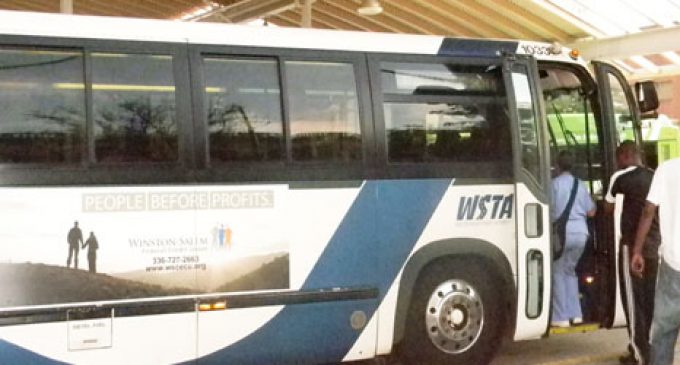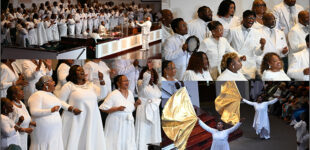Sunday bus service a-go

The Winston-Salem Transit Authority and Trans-Aid are poised to begin offering Sunday service later this year, city officials say.
City Council members voted Monday to approve a $378.9 million budget. The budget sets the property tax rate at 53 cents per $100 of assessed value, which is 3.9 cents higher than the current rate of 49.1 cents. But since more than 60 percent of city property owners saw a drop in their house values, most residents will pay less taxes this year.
The budget includes funding for seven WSTA Sunday bus routes that are expected to be offered starting in the fall.
“I think it will be a good thing for our community,” commented City Council Member James Taylor. “We’ve had a lot of outcry for Sunday service, and the new budget does just that.”
Assistant City Manager Greg Turner says the addition of Sunday services will create around a dozen jobs and help get Winston-Salem in line with other large cities in the state.
“We’re one of the last, if not the last, major city in North Carolina that doesn’t have it,” he commented. “…We’re a seven days a week city just like everyone else, so we wanted the public to be able to use public transportation seven days a week.”
The city will offer Sunday service on seven of its most highly utilized routes. The routes may have slight variations on Sundays but will be modeled after the Saturday schedule, Turner said. It is the first time in Turner’s more than 30 year career that the city has offered Sunday service, and he believes it will improve the quality of life for residents and enhance the city’s offerings for visitors.
“Anytime a service is offered seven days a week and 365 days a year, you can expect it to be more useful for both livability and convenience,” he stated. “We’re glad to offer this service for the first time. We hope that people will take advantage of it.”
City native Randy Smith says he is looking forward to the implementation of Sunday service.
“It’s about time they catch up with the rest of them – with Charlotte and other cities,” said the grandfather of 13, who rides the bus daily Monday–Saturday. “Just because it’s Sunday, people still need to get around.”
Reading, Penn. native Earnest Hancock only recently began riding the bus to save gas money, but says he is also planning to utilize public transportation on Sundays.
“I think it’ll help people out, like helping more people get downtown when stuff is going on,” said Hancock, a Forsyth Technical Community College student.
City native Bobby Wilson has been advocating for the city to add Sunday service for years. Wilson recalls paying a dime to ride on the Safe Bus – a black-owned bus company that was eventually absorbed by the WSTA – on Sundays. He said he was thrilled that city buses will soon be running seven days a week.
“I am overwhelmed that it’s going to happen because it opens a new chapter in Winston-Salem, a serious new chapter,” declared the 68-year-old, who plans to use the bus to get back and forth to services at his church, St. Stephen Missionary Baptist. “It’s good for the city, it’s good for the green – the environment – and it puts us on par with other cities of our size. Across the board, our city will be greatly enhanced.”
Turner said he expects it will take roughly four months for the city to hire and train drivers and solidify routes, pushing the expected rollout of Sunday service to October or November.
The new budget also includes merit raises of up to three percent for city employees, a measure that is long overdue in the eyes of Taylor, who represents the city’s Southeast Ward.
“If we want to retain our brightest and our best employees, we have to pay people, and this budget addresses that,” Taylor said. “It made me feel good to be able to turn to our city employees (during the budget meeting) and say thank you.”
Overall, the budget received higher marks than usual from Council members, in part because of the work of the Citizens’ Organizational Efficiency Review Committee (COERC), a nine-member committee that worked to identify opportunities for increased revenue for the city and areas where services and/or expenses could be cut. Among the COERC recommendations that the city adopted in its fiscal year 2013–2014 budget were a $5 increase in maximum parking fines, increased fees for cemetery plots and grave openings and increased fines for weeded-lot violations.
“I’m definitely happy with the budget,” commented Taylor, noting that he has voted against the last two budgets. “This year, we actually came back and found well over $1 million in savings, just by cutting some of the fat.”
Making cuts in other areas allowed city leaders to keep taxes increases relatively low, according to City Council Member Derwin Montgomery. Because most homes in the city have been devalued following Forsyth County Tax Assessor’s most recent revaluation, many homeowners will actually be paying less for property taxes despite the increase, added Montgomery, who represents the city’s East Ward.
“Their recommendations have been very pivotal in keeping the tax rates from going up to revenue neutral,” he said, referencing a commonly used taxing procedure that allows the government to still receive the same amount of money despite changes in property values and other factors. “…This budget, for the majority of the citizens of Winston-Salem when it comes to the taxes that they’re paying, they will feel nothing changing, or they will see a decrease.”
The budget also included funding for several projects, including revitalization efforts on the Martin Luther King Jr. Drive Corridor and the Creative Corridors initiative, in addition to water and sewer and storm-water management projects and improvements at Winston Lake Golf Course. Montgomery said he would’ve liked to have seen more funding go to infrastructure development and maintenance, which he says is greatly needed citywide.
“It’s going to probably come down to us looking to bring a bond to voters within the next year or so in order to get some of these projects done,” he stated. “It’s about $500 million across the city in needed capital investment. We’re just chipping away at that, but there’s a lot that needs to be invested in.”
The City Council voted to not to accept merit raises for itself.














